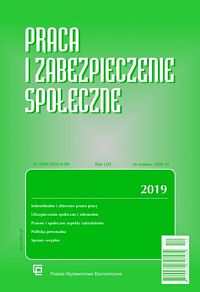
- Articles
- "Work on a better future." On the report of the World Commission on the future of work (ILO)
The report of the World Commission on the future of work, entitled "Work on a better future", which will be the basis for this year's debate of the International Conference (June), celebrating the centennial of the International Labor Organization this year, does not fully meet the expectations. First of all, it does not take into account the eventuality of the end of work following digitalisation. Consequently, the issue of preparing the world of work to this end is not addressed. Secondly, it is doubtful to identify important, contemporary problems of work, especially because the report neglects or treats problems such as the effects of globalization (escape from social law, the development of inequalities, specific movements on the labor market) fragmentarily. or the condition of social law (including the need to adapt it to the present day). Thirdly, the World Commission has not raised the question of the effectiveness of the ILO, operating as an international organization in the global environment, although the effectiveness of the task is to fulfill its tasks and thus its survival.
- "Work on a better future." On the report of the World Commission on the future of work (ILO)
- Studies and studies
- Digitization of labor law
The author presents changes introduced by the digitization of the labor law, under which he understands the social processes and technological changes taking place in the labor law regulations in the era of the fourth industrial revolution in post-industrial societies. He believes that in the post-industrial era, changes are necessary in the law of work, for which the factor that distinguishes work performed under an employment relationship from work provided under civil law contracts and as part of self-employment is the legal institution of subordination of the employer's employee. Such a division of employees and non-employees disrupts the balance between social protection, competitiveness and flexibility of labor market institutions. The author discusses the work platforms as an example of digitization of employment. He analyzes the basics and legal framework of employment of people using their mediation. He emphasizes that, with the exception of France in other European Union countries, the status of those hired through these platforms has not been regulated.
- Digitization of labor law
- Interpretation and practice
- Doubts about the new definition of an employer in trade union law
The subject of discussion is the legal definition of the employer set out in the amended Act of May 23, 1991 on trade unions. This definition leads to the conclusion that the employer is an organizational unit employing both employees and persons performing paid work on a basis other than the employment relationship, regardless of whether it is a civil law entity. The author believes that this legislative amendment strengthens the managerial concept of the employer. It means sanctioning in collective labor relations of the employer's concept shaped by art. 3 codec work, at the same time leading to the transplantation of this concept into the non-working environment. - Representativeness of trade union organizations in the light of the amendment to the Trade Unions Act
The author discusses and evaluates new solutions regarding the representativeness of trade union organizations introduced into the Trade Unions Act by an amendment of July 5, 2018. Analyzes the most important elements related to the construction of representativeness at the company level, i.e. prerequisites for acquiring representativeness, information on the number of trade union organizations and privileged mechanism - representative organizations. In the author's opinion, the actions undertaken by the legislator in the analyzed area are of an evolutionary nature and should be assessed as positive, improving the existing regulations. - Impact of the employee's conviction on a contractual employment relationship and the protection of his personal data
The author analyzes the scope of the employer's right to process personal data concerning the criminal records of the employee and the person applying for employment, for the purposes of establishing, continuing and terminating the contractual employment relationship.
- Doubts about the new definition of an employer in trade union law
- From the Supreme Court's case law
- Subject to voluntary social insurance
The author refers to the case law of the Supreme Court in relation to the subject of voluntary social insurance. At the same time, it highlights significant discrepancies in this case law. - Settlement and the limits of the employee's material liability. Gloss to the judgment of the Supreme Court of February 21, 2018, III PK 14/17
In a vote to the judgment of 21 February 2018, III PK 14/17, the author expresses his approval for the position of the Supreme Court that an out-of-court settlement obliging an employee to be financially liable under Art. 114 k.p. to pay compensation in excess of the limit under Article 119 k.p. it is invalid (Article 58 (1) of the CC in connection with Article 300 of the Code). It remains in line with the protective function of labor law, the principles of employee preference and limited employee financial liability. In the same way, the author considers the correct issue of a cassation ruling in the case by the Supreme Court.
- Subject to voluntary social insurance
- According to the National Labor Inspectorate
- Legal Department of the Main Labor Inspectorate
- Monitoring at the workplace
- New recipes
- Review of Officials Act from 2019, item 198 to item 411
Praca i Zabezpieczenie Społeczne (Work and Social Security) - full list






